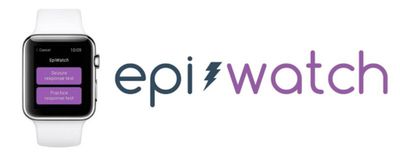Medical doctors who used an Apple Watch app to discover the most common triggers of epileptic seizures will present their findings at the American Academy of Neurology's 69th Annual Meeting today in Boston, Massachusetts.
The 10-month study involved 598 people who tracked their seizures with an iPhone app called EpiWatch, which was built by Johns Hopkins using Apple's ResearchKit software framework. The app features a custom Apple Watch complication that provides patients with one-touch access to record accelerometer and heart rate sensor data. When participants felt a seizure aura coming on, they were asked to launch the app to let it record their heart rate and movements for 10 minutes.

After the seizure had come to an end, participants filled out a brief survey about seizure type, aura, loss of awareness, and possible trigger that led to the seizure.
"The data collected will help researchers better understand epilepsy, while helping people with epilepsy keep a more complete history of their seizures," said study author Gregory Krauss, MD, in a press release. "The app also provides helpful tracking of seizures, prescription medication use and drug side effects -- activities that are important in helping people manage their condition."
Overall, 40 percent of the group tracked a total of 1,485 seizures, with 177 people reporting what triggered their seizures. Stress was revealed to be the most common trigger, and was linked to 37 percent of the seizures, while 18 percent of sufferers identified lack of sleep as another contributing factor. Meanwhile, menstruation was found to be a cause in 12 percent of recorded seizures, and overexertion accounted for 11 percent.
Stress was more commonly reported as a trigger for participants who worked full-time (35 percent), compared to those who worked part-time (21 percent), were unemployed (27 percent), or were disabled, (29 percent).
"Seizures are very unpredictable," said Krauss. "Our eventual goal is to be able to use wearable technology to predict an oncoming seizure. This could potentially save lives as well as give people with epilepsy more freedom. The data collected in this study helps us take a step in that direction."
The insights result from one of three ResearchKit studies launched by Johns Hopkins and Oregon Health & Science University in October 2015, which sought to learn more about autism, epilepsy and melanoma.
(Thanks, Fred!)





















